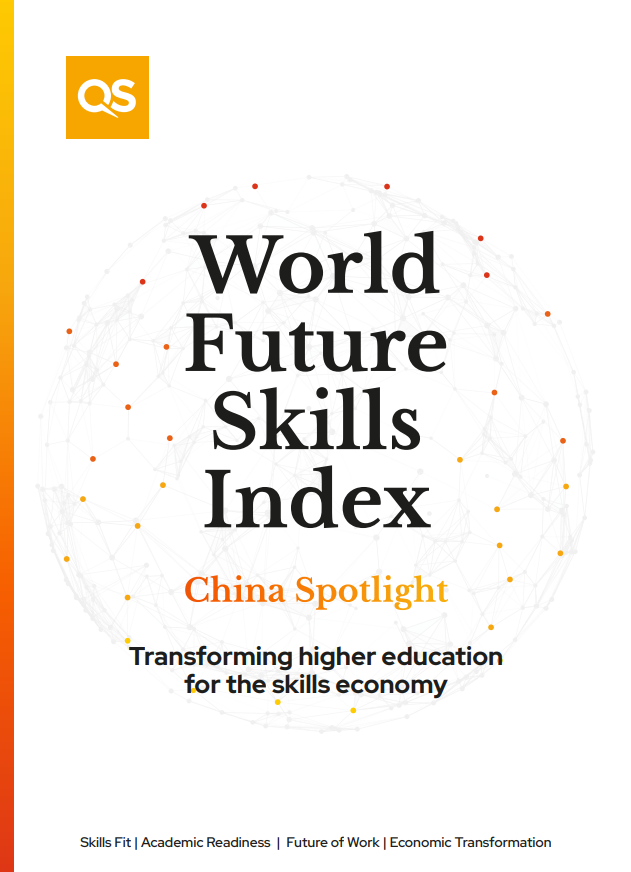China ranks among the world’s strongest in the QS World Future Skills Index, with top scores in Academic Readiness, Future of Work, and Economic Transformation. Yet, lower performance in Skills Fit and limited employer demand for digital expertise reveal gaps between graduate capabilities and evolving workforce needs.
Welcome to the China Spotlight on the QS World Future Skills Index, where we explore higher education’s critical role in shaping the workforce of tomorrow. This tailored resource empowers you to analyse China’s future skills supply and demand, benchmark key industry jobs and skills gaps against over 80 countries, and align your higher education system with the skills training required for economic transformation.
China performance overview
China’s higher education system plays a central role in powering economic growth, with world-leading performance in Academic Readiness (93.9), Future of Work (87.8), and Economic Transformation (88.5). However, a notable gap remains in employer demand for digital expertise— China’s Future of Work Digital sub-indicator score is 61.5, indicating that businesses are not yet prioritising digital talent to the same extent as AI (90.2) or Green (81.5) skills. At the same time, Skills Fit (78.5)—China’s lowest-performing indicator—suggests that graduates are not consistently equipped with the applied, workplace-ready skills employers need. This dual challenge reflects a growing disconnect between what is taught and what is valued by the labour market. Unless universities align more closely with industry priorities, particularly in digital transformation and entrepreneurial application, China risks under-utilising its talent pipeline and missing opportunities for long-term innovation
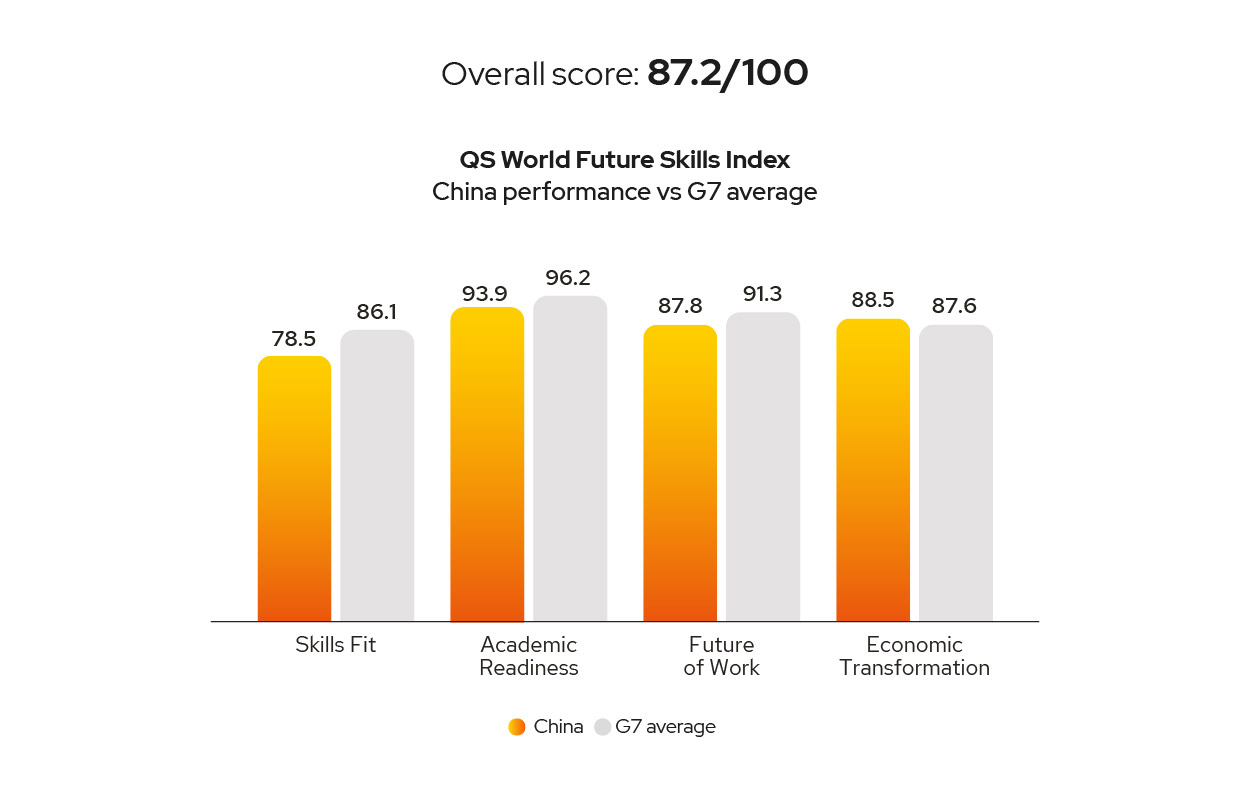
About the indicators
Skills Fit
The Skills Fit indicator measures how well countries are equipping graduates with the skills that employers desire. This is assessed by determining the gap between what employers find important and their level of satisfaction with the skills provided by graduates. This is done using data from the QS Global Employer Survey, the largest of its kind, and data from the World Bank Group. Since 2021, over 100,000 employers have rated the importance of certain skills and their satisfaction in their graduate hires.
Future of Work
The Future of Work indicator evaluates a country’s readiness to recruit for the skills needed in the jobs of tomorrow. Specifically, it measures how well the job market is prepared to meet the growing demand for digital, AI, and green skills, all of which are becoming critical as economies transition towards technology-driven and sustainable industries.
Academic Readiness
This dimension measures how well a country is prepared for the future of work. We look at the number of universities assessed for the QS World University Rankings by Subject, and how they perform. We then measure this in tandem with population size – if a country has a large population but few well-ranked institutions, for example, the country will be penalised.
Economic Transformation
Economic Transformation uses a weighted formula to assess a country’s readiness to support the growth and future of work and skills by examining various key indicators. The Index highlights whether a country has the infrastructure, investment power, and talent available to transition to industries driven by AI, digital transformation, green technologies, and high-skilled work, using data from the World Bank Group, UNESCO Institute for Statistics and the Education Policy Institute
China performance in detail
Skills Fit
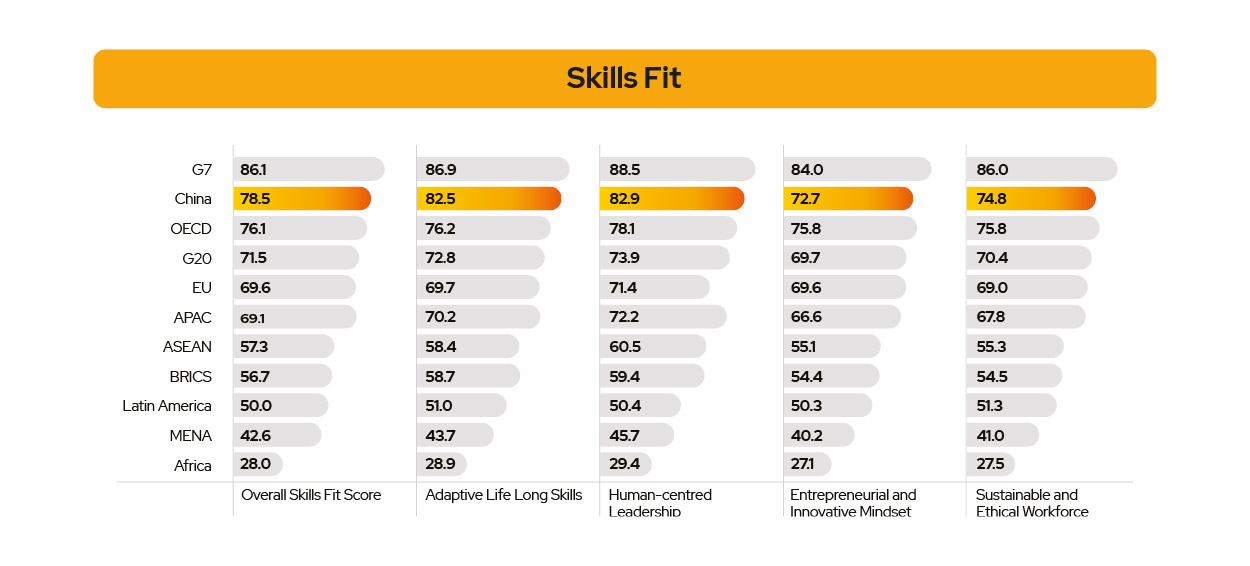
China’s Skills Fit score (78.5) highlights a workforce with good adaptability and leadership capabilities—evident in some sub-indicators. However, the comparatively lower Entrepreneurial & Innovative Mindset (72.7) reveals limitations in embedding innovation into workplace culture. Cultivating entrepreneurial thinking, risk-taking, and creativity will be essential to drive business transformation. While Chinese graduates are technically skilled, the country’s future competitiveness will depend on enhancing soft and innovation-related skills across all sectors. Industry-linked problem-solving projects, real-world simulations, and hands-on entrepreneurial programmes will be vital in closing this mindset gap.
Future of Work
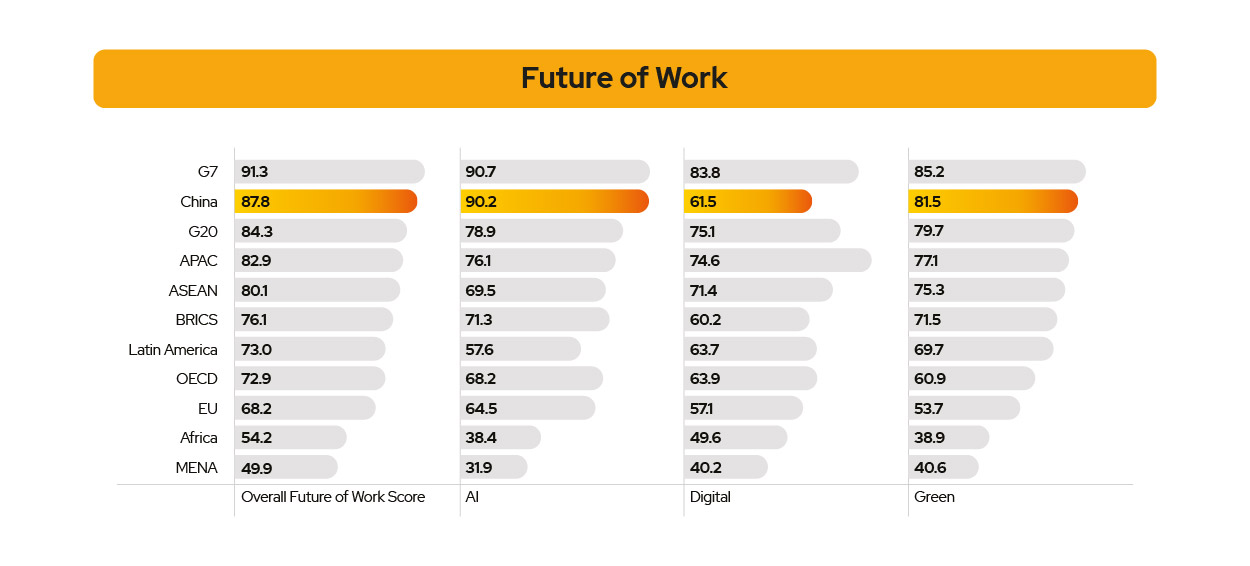
China’s Future of Work score (87.8) signals strong demand for future skills, yet Digital (61.5) lags behind AI (90.2) and Green (81.5), suggesting businesses and education systems are not fully aligned in digital transformation. This mirrors a common pattern where education pipelines are not keeping pace with rapid digital evolution. Furthermore, the Skills Fit score (78.5) highlights a disconnect between employer needs and the workplace-readiness of graduates. To close this gap, universities must recalibrate curricula with a stronger focus on cross-disciplinary digital fluency, expand experiential learning, and ensure digital knowledge is embedded not only in tech programmes, but across business, science, and engineering fields
Academic Readiness
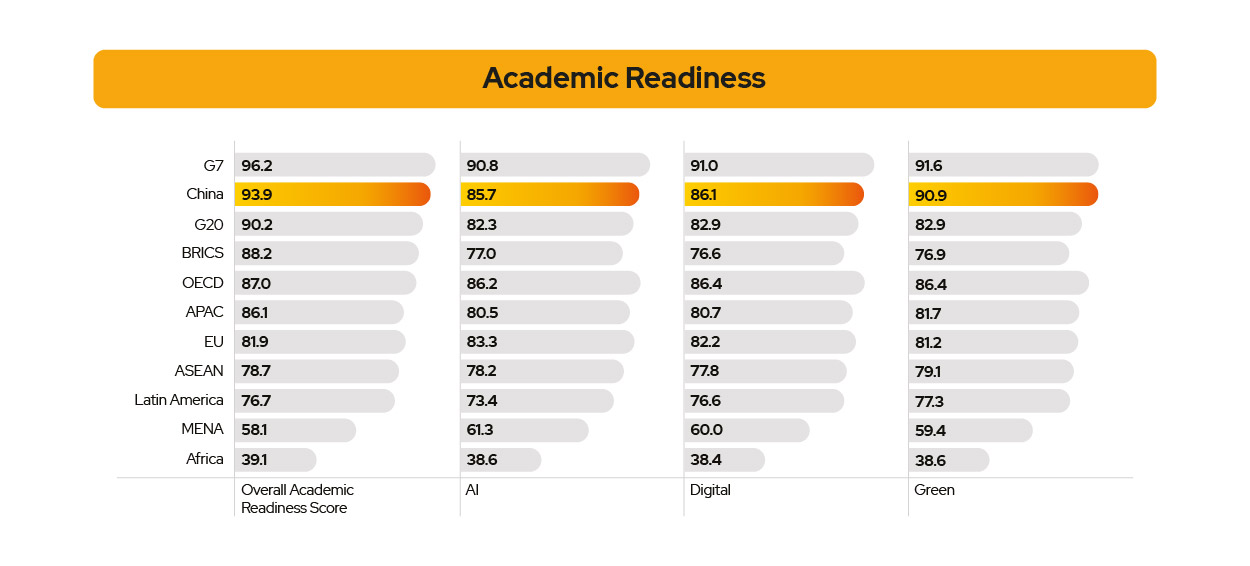
China’s universities demonstrate global leadership in future-focused education. Strengths in Digital (86.1) and Green (90.9) education reflect deep investments in emerging disciplines. However, AI (85.7)—while still high—ranks lowest, pointing to a strategic opportunity. As AI becomes increasingly central to the economy, universities must expand interdisciplinary AI training and strengthen AI-related research capacity. In particular, embedding real-world applications, work-based learning and problem-solving will ensure students are technically proficient and industry ready. Enhancing the academic foundation in AI will help position China’s graduates at the forefront of future skills leadership
Economic Transformation
.jpg)
China’s Economic Transformation score (88.5) reflects a high-performing economy with strong GDP growth, labour productivity, and investment. However, Future-Oriented Innovation & Sustainability (49.1) reveals that green innovation is not yet a core driver of transformation. This suggests universities could play a larger role in enabling the shift toward a sustainable economy. Compared to global competitors, China has the scale but now must ensure quality—particularly in turning research breakthroughs into solutions. Universities should enhance cross-sector innovation partnerships, prioritise green entrepreneurship, and increase the integration of environmental technology across academic disciplines to support long-term resilience.
Conclusion and analysis
China’s education system ranks among the world’s strongest, with high scores in Academic Readiness (93.9), Future of Work (87.8), and Economic Transformation (88.5). However, Skills Fit (78.5) suggests that despite the talent being available, employers are not fully capitalising on it—especially in Digital, where Future of Work (61.5) reflects relatively low employer demand for digital skills. This mismatch indicates a need to better align industry priorities with the capabilities of graduates. To sustain innovation-led growth, universities must deepen industry collaboration, broaden applied digital education, and encourage greater employer recognition of the strategic value of digital and interdisciplinary skills.
Our analysis and recommendations:
- China’s strong Future of Work (87.8) and Economic Transformation (88.5) scores indicate robust employer demand and economic momentum. Yet the lower Skills Fit (78.5) score reveals a mismatch between graduate capabilities and evolving workforce needs. Universities must sharpen their focus on job-ready skills by embedding applied learning, employer-led training, and entrepreneurial thinking into programmes.
- Despite strengths in AI (90.2) and Green (81.5), China’s Future of Work score for Digital (61.5) suggests relatively weak employer demand for advanced digital skills. Universities can play a catalytic role by strengthening digital curricula and fostering cross-disciplinary digital fluency that responds to emerging industry expectations and shifts in the global tech economy.
- While Academic Readiness is among the highest globally (93.9), ensuring that excellence in AI, Digital, and Green education translates into innovation impact remains essential. By prioritising research commercialisation, industry-aligned R&D, and problem-solving education, China can ensure that its talent pipeline drives sustainable growth, future competitiveness, and global leadership in advanced technologies.
This tailored resource empowers
The Skills Fit indicator measures how well countries are equipping graduates with the skills that employers desire. This is assessed by determining the gap between what employers find important and their level of satisfaction with the skills provided by graduates. This is done using data from the QS Global Employer Survey, the largest of its kind, and data from the World Bank Group. Since 2021, over 100,000 employers have rated the importance of certain skills and their satisfaction in their graduate hires.
UK’s future skills supply
The Skills Fit indicator measures how well countries are equipping graduates with the skills that employers desire. This is assessed by determining the gap between what employers find important and their level of satisfaction with the skills provided by graduates. This is done using data from the QS Global Employer Survey, the largest of its kind, and data from the World Bank Group. Since 2021, over 100,000 employers have rated the importance of certain skills and their satisfaction in their graduate hires.
Economic transformation
The Skills Fit indicator measures how well countries are equipping graduates with the skills that employers desire. This is assessed by determining the gap between what employers find important and their level of satisfaction with the skills provided by graduates. This is done using data from the QS Global Employer Survey, the largest of its kind, and data from the World Bank Group. Since 2021, over 100,000 employers have rated the importance of certain skills and their satisfaction in their graduate hires.









.jpg)





